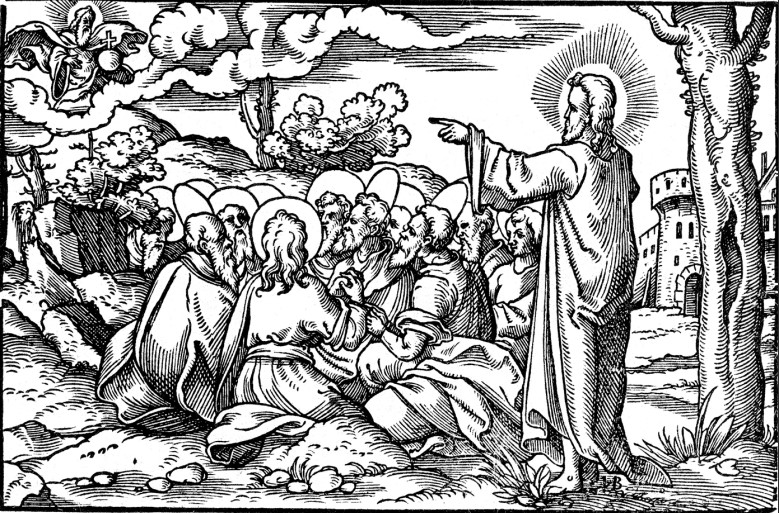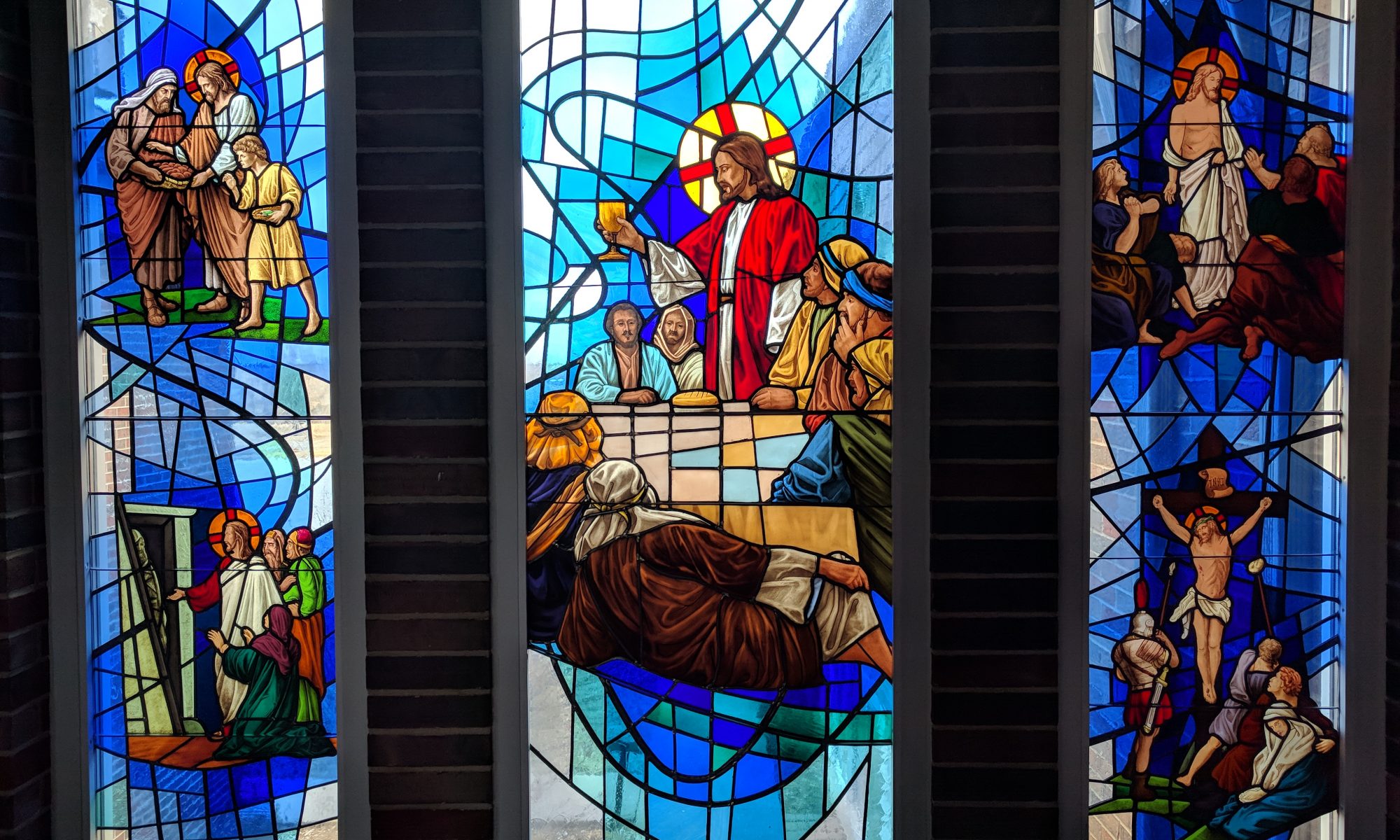
Lessons: Numbers 21:4-9, James 1:22-27, John 16:23-33
Hymns: LSB 668, 459, 663, 633, 766, 490
Grace, mercy, and peace to you from God our Father and our Lord and Savior, Jesus Christ. Amen.
What does one preach when he knows he’s a has-been pastor to the saints here? What does one say to a congregation he’s leaving? I could spend the entire time telling stories of my memories here. I could go on publicly thanking just about all of you for one reason or another. I could tell you how much I will miss you and this place—how much I will miss my ministry here—how much I will miss the community and everything that made our lives a joy these past eight years.
Just as our Lord went away and did not leave the disciples alone, so also my leaving does not mean you are left alone. Accepting a call means that I will be serving Christ and His Church in a new location. While I realize there’s disappointment that I am leaving, I know that Christ will continue to shepherd His Church here at Grace. Just as He sent me to preach to you God’s pure Word and rightly administer the Sacraments, so also, I am confident that God will continue to send men into your midst to do the same. The man you have chosen for your vacancy demonstrates that. Pastor Kuddes is a faithful pastor who loves God and His Word. And for that, I am filled with joy.
As I considered what to preach for my final sermon, something dawned on me. Nothing is really over. I will keep on preaching. You will keep on hearing the Word and going to Communion. So, for a final Sunday sermon here, you should really hear from me what you need to hear: God’s Word. For “faith comes from hearing, and hearing through the word of Christ” (Rom. 10:17).
So now I ask you: Why do you go to church? Ask this question to a crowd and different answers will be given: I go to be forgiven. I go to receive Communion. I go to pray. I go to sing. I go to learn more about God. I go to be uplifted. I go because it is habit.
All of these reasons are fine. But if you only go out of habit, there’s a problem. You should expect to give and receive something. You should expect to offer your sacrifices of tithes, praises, and thanksgiving. You should expect to be fed God’s Word and Sacrament.
And if you only go to feel uplifted, there’s also a problem. Church is not a drug to merely give you a good feeling. Instead, God visits you with His grace, absolves you, blesses you, and grants you His peace. This is far, far more than a good feeling!
Now what if I told you that the real reason why you should go to church is to be crucified? Crucified?! Now that doesn’t sound like an effective method for evangelism or bringing everyone in who has become disenchanted. Just imagine it. “Hey, Jim! Want to go with me to church?” Oh, I don’t know. “Come on!” Why? “So you can be crucified!” Crucified? That doesn’t sound like fun. “Well, we don’t go to church to have fun.” OK, so church isn’t fun and you get crucified. That sounds awful! “It isn’t. Come and see! You’ll be happy you did!”
That’s not a convincing argument, is it? Yet, inspired by God the Holy Spirit, St. Paul writes, “Those who belong to Christ Jesus have crucified the flesh with its passions and desires” (Gal. 5:24). I’m not talking about taking the Israelites out to the wilderness to die. Yet despite their rebellion and suffering out there, God did deliver them and brought them into the Promised Land. It serves as a picture of what we face in this life. After all, Jesus said, “I have said these things to you, that in Me you may have peace. In the world you will have tribulation. But take heart; I have overcome the world” (John 16:33). And He invites us to pray because we accept Christ’s cross and our crosses. As we endure hardships in this life, we turn to the Lord in prayer—trusting that His will be done.
The disciples were not ready for Christ’s cross. That’s why they were so troubled on Maundy Thursday with His teaching. One preacher said, “It must be said that our unwillingness to bear a cross arises from an inadequate and faulty understanding of Christ’s redemptive mission. We tend to let our Christianity deteriorate into a materialistic religion. Christ is less a suffering, sin-atoning Savior and more a divine Helper to supply our temporal wants. We think less of Him as saving us for eternal good and more of saving us for earthly good. The Gospel becomes a tranquilizer to soothe our nerves and help us to do more positive thinking. Saving faith becomes confidence in the success of earthly endeavors” (Ernest Drews, 1960 Conc. Pulpit).
Think about crucifixion for a moment. To crucify a person means that someone nails another person’s hands and feet to a cross. That cross is raised up and inserted into a hole. The crucified one hangs on the cross until he dies of suffocation. It’s incredibly painful. It’s gory. It shows how depraved man is for coming up with such a punishment unto death. Yet, this act is part and parcel to the Christian faith. For just as Moses lifted up the serpent in the wilderness so also the Son of Man had to be lifted up on that cross (Num. 21:9, John 3:14-15).
So now we give thanks for the cross. We have crosses everywhere in our churches and hopefully also in our homes—even at national cemeteries. The cross is central to the Christian faith because Jesus died on that cross in order to set us free from our sin, to defeat Satan, and overcome death. So, we preach Christ and Him crucified, which is a stumbling block to the Jews and foolishness to the Gentiles (1 Cor. 1:21-25).
Why is the cross so important? Because it is there on the cross where Christ paid for our sins. It is there where He earned our salvation. It is there where He declared the world not guilty. It is there where He displays His deep compassion for us. It is there where He makes it clear of His deep love for us and His desire for us to live with Him forever. And it is there where our Lord is glorified. He was willing to be sacrificed on the altar of the cross in our place so that we may live eternally and abide in Him.
When Jesus invites us to be His disciples, He calls on us to carry crosses and be crucified. Jesus said in Luke 9:23-24, “If anyone would come after me, let him deny himself and take up his cross daily and follow me. For whoever would save his life will lose it, but whoever loses his life for my sake will save it.” You see, the Christian faith is literally a matter of life and death: death to sin and life in Christ. For it is also written, “For the wages of sin is death, but the free gift of God is eternal life in Christ Jesus our Lord” (Rom. 6:23) And earlier in that same chapter of Romans 6, it is written, “Do you not know that all of us who have been baptized into Christ Jesus were baptized into his death? We were buried therefore with him by Baptism into death, in order that, just as Christ was raised from the dead by the glory of the Father, we too might walk in newness of life” (Rom. 6:3-4). We die in Baptism. We rise in Baptism. Our sinful flesh is crucified, and we are raised in Christ to walk in the newness of life.
Dead to sin. Alive to God in Christ Jesus our Lord as we also hear in Romans 6: “So you also must consider yourselves dead to sin and alive to God in Christ Jesus” (v. 11). Colossians 2:11-13 states, “In him also you were circumcised with a circumcision made without hands, by putting off the body of the flesh, by the circumcision of Christ, having been buried with him in baptism, in which you were also raised with him through faith in the powerful working of God, who raised him from the dead. And you, who were dead in your trespasses and the uncircumcision of your flesh, God made alive together with him, having forgiven us all our trespasses.” True life is found in crucifixion. What once was a tool for death is now a means of life. What the Jews meant for evil God meant for good. They tried to eliminate Jesus by crucifying Him. God used the death of our Lord to eliminate our sin.
Our flesh is crucified with its passions and desires. Our desire is no longer to live according to the lusts of the flesh, but to live according to the Spirit. As Christians we take no delight in sin. We do not encourage others to sin. We strive to do what is right.
But we still fail. The flesh is at war with our spirit. On this side of the grave, there will always be that tension between the flesh and the spirit. Our flesh is always telling us things opposed to Christ and His Word. Our flesh is always tempting us. Our flesh is always trying to get us to return to slavery to that flesh.
That flesh needs to be crucified—daily. To crucify that flesh with its passions and desires is to hear Christ, repent of our sin, eat the Body and drink the Blood of our Lord Christ, and to pray in faith. Because that war is always taking place in our own bodies, we need Christ—to feed on Him through Word and Sacrament.
It isn’t a matter of want or when it is convenient; It’s all the time. That’s why Christians go to church every Sunday. That’s why Christians hunger and thirst for the Sacrament frequently. That’s why Christians study the Scriptures at home. They desire to let the Spirit work in them. They want their flesh crucified. They want to live in Christ, enjoying His freedom and receiving the gift of salvation.
The Christian life is the way of the cross. It is hearing Christ crucified. It is the true life in this world—even the Spirit-led willingness to suffer on account of the Gospel.
So, it is true. We go to church to be crucified. We bring our babies to the baptismal font so that this crucifixion can take place—to die with Christ and be raised in His righteousness.
What, my friends, can we have in this life that’s better? Discipleship means being God’s children, set free from sin and death.
God bless you. If I don’t see you again in this life, I look forward to seeing you again in the Church Triumphant! Amen.
The peace of God which passes all understanding keep your hearts and minds in Christ Jesus to life everlasting. Amen

